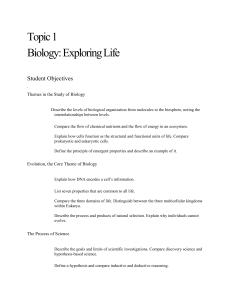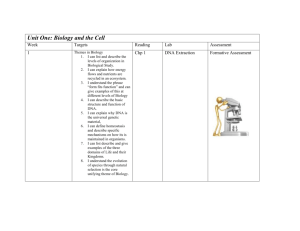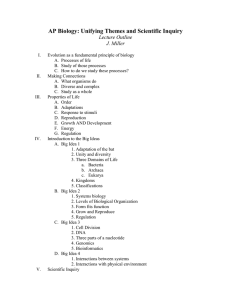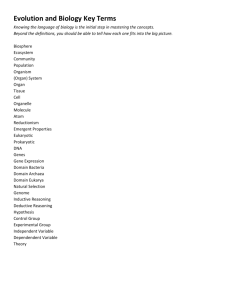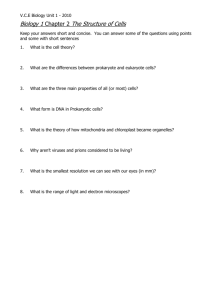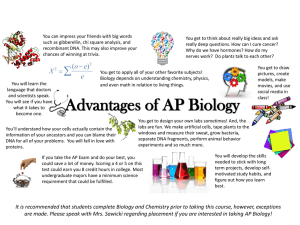Delia Cossia August 29, 2012 Biology Outline Chapter 1 Overview
advertisement
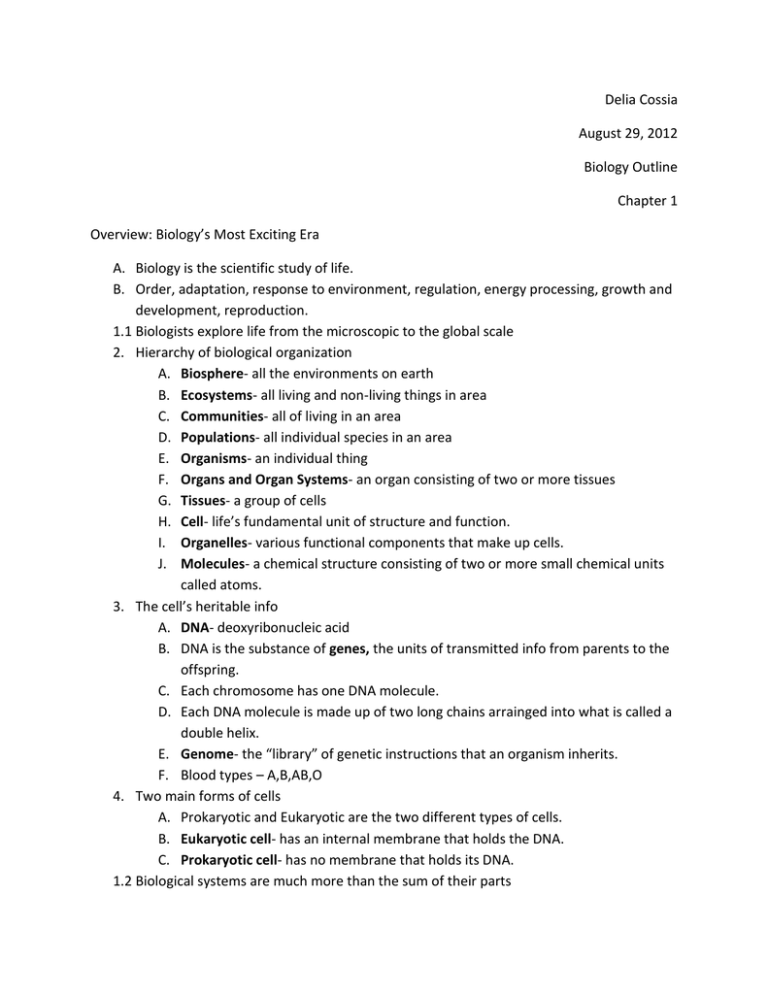
Delia Cossia August 29, 2012 Biology Outline Chapter 1 Overview: Biology’s Most Exciting Era A. Biology is the scientific study of life. B. Order, adaptation, response to environment, regulation, energy processing, growth and development, reproduction. 1.1 Biologists explore life from the microscopic to the global scale 2. Hierarchy of biological organization A. Biosphere- all the environments on earth B. Ecosystems- all living and non-living things in area C. Communities- all of living in an area D. Populations- all individual species in an area E. Organisms- an individual thing F. Organs and Organ Systems- an organ consisting of two or more tissues G. Tissues- a group of cells H. Cell- life’s fundamental unit of structure and function. I. Organelles- various functional components that make up cells. J. Molecules- a chemical structure consisting of two or more small chemical units called atoms. 3. The cell’s heritable info A. DNA- deoxyribonucleic acid B. DNA is the substance of genes, the units of transmitted info from parents to the offspring. C. Each chromosome has one DNA molecule. D. Each DNA molecule is made up of two long chains arrainged into what is called a double helix. E. Genome- the “library” of genetic instructions that an organism inherits. F. Blood types – A,B,AB,O 4. Two main forms of cells A. Prokaryotic and Eukaryotic are the two different types of cells. B. Eukaryotic cell- has an internal membrane that holds the DNA. C. Prokaryotic cell- has no membrane that holds its DNA. 1.2 Biological systems are much more than the sum of their parts 2. The Emergent Properties of Systems A. Emergent properties- the arrangement and interactions of parts as complexity increases. 3. The Power and Limitations of Reductionism A. Reductionism- reducing complex systems to simpler components that are more manageable to study. 4. Systems Biology A. Systems biology- to model the dynamic behavior of whole biological systems. B. Systems biology is relevant to the study of life at all levels. C. Accurate models will enable scientist to predict how a change in one or more variables will impact other components and the whole system. 5. Feedback regulation in biological systems A. Feedback- a self-regulation by a mechanism. B. In feedback regulation, the output, or product, of a process regulates that very process. C. Negative Feedback- accumulation of an end product of process slows that process. D. Positive Feedback- in which an end product speeds up its production. E. Positive feedback occurs as chemicals released by the platelets attract more platelets. F. Feedback is a regulatory motif common to life at all levels, from the molecular level to the biosphere. 1.3 Biologists explore life across its great diversity of species 1. Grouping Species: The Basic Idea A. Taxonomy- the branch biology that names and classifies species. 2. The three domains of life A. The three domains are Bacteria, Archaea, and Eukarya B. Both domain bacteria and archaea consist of prokaryotic cells. C. Domain bacteria and archaea were once called kingdom monera because they thought they shared the same characteristics. D. Kingdom Monera no longer exist because Domain bacteria and archaea don’t share enough characteristics to be in the same kingdom. E. All eukaryotic cells are grouped into various kingdoms in domain eukarya. 1.5 Biologists use various forms of inquiry to explore life A. Inquiry- a search for info and explanations. B. Two types of scientific inquiry: discovery science is about describing nature. Hypothesis-based science is about explaining nature. 1. Discovery Science A. Discovery science- describes natural structures and processes as acuratley as possible through careful observation and analysis of data. B. Data- recorded observation C. Inductive reasoning- a type of logic based on important conclusions. 2. Hypothesis-Based Science A. Hypothesis-based science- the observations and inductions of discovery science engage inquisitive minds to seek natural causes and explanations for those observations. B. Hypothesis- a tentative answer to a well-framed question. C. Deductive reasoning- logic that flows in the opposite direction, from the general to the specific. D. A hypothesis must be testable. E. A hypothesis must be falsifiable, there must be some observation that could reveal if such an idea is actually true or not. F. But no amount of experimental testing can prove a hypothesis beyond a shadow of a doubt. G. Controlled experiment- an experimental group that is compared with a control group. H. Theory- an untested speculation, but I is much broader than a hypothesis. I. Model- a representation of theories or natural phenomena. Ex diagraphs, graphs, 3D objects, math equations. J. Technology- scientific knowledge for some specific purpose. 1.6 A set of themes connects the concepts of biology A. In some ways, biology is the most demanding of all sciences, partly because living systems are so complex and partly because biology is a multidisciplinary science that requires knowledge of chemistry, physics, and mathematics. B. Biology is also the science most connected to the humanities and social sciences.
